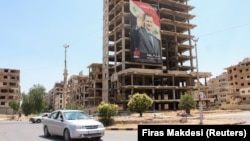The humanitarian needs in Syria remain great. That’s why working out a cross-border agreement to resume aid shipments is critical.
The Syrian regime of Bashar al-Assad’s announcement to allow UN aid deliveries through Bab al-Hawa acknowledges the need for cross-border assistance, noted U.S. Ambassador to the United Nations Linda Thomas-Greenfield. But it includes unacceptable restrictions that would hinder relief and put aid workers at risk. Additionally, the regime’s permission is only for six months, half the minimally necessary period recommended by the Secretary-General.
The Assad regime has a record of impeding UN humanitarian activities in Syria. The regime’s unacceptable conditions and demands are consistent with that troubling record.
“For this reason, the United States has joined other major donors in making clear that any cross-border access arrangement must include five key elements,” declared Ambassador Thomas-Greenfield:
“The UN should be allowed to engage with all parties on the ground, consistent with how it delivers assistance around the world. . . .The UN should be able to continue to operate response hubs outside regime-held areas. And the regime should not interfere with access arrangements between the UN and local authorities in non-regime-held areas.”
“Access should be granted for as long as possible, and must not lapse in the middle of winter,” continued Ambassador Thomas-Greenfield.
“Guaranteed access is essential to providing the predictability and the efficiency needed by donors, UN partners, and the Syrian people. Given the overwhelming and persistent humanitarian needs in northwest Syria, there is no justification for short-term, ad hoc access guarantees.”
The UN should maintain its ability to determine assistance allocation based solely on needs and consistent with the principles of neutrality and impartiality.
And finally, any arrangement must maintain the cross-border monitoring operation originally established under Resolution 2165 and avoid new reporting requirements for local partners or beneficiaries.
More than 62,000 trucks full of lifesaving aid have crossed into Syria since the Council unanimously supported Resolution 2165 in 2014. And yet, the humanitarian crisis has never been more dire. Twelve years of war and this year’s earthquakes have pushed the Syrian people to the brink.
Given Assad’s shameful record, the Security Council must remain deeply engaged on humanitarian matters in Syria, urged Ambassador Thomas-Greenfield. The United States will never waver in its support for the needs of the Syrian people.






